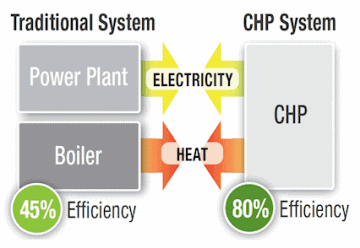Combined Heat and Power (CHP)
Combined Heat and Power (CHP), also known as cogeneration, is a highly efficient approach to generating electricity and capturing heat simultaneously. By utilizing the waste heat produced during electricity generation, these systems offer significant energy savings and environmental benefits.
What is CHP?
It is a technology that generates electricity and captures usable heat produced during the process. Unlike conventional power plants, which waste a significant amount of heat, CHP systems make use of this heat to provide heating, cooling, or other industrial processes. By integrating the production of electricity and heat, they achieve overall energy efficiency levels of up to 90%, far surpassing traditional power generation methods.
How does CHP work?
They consist of a prime mover, such as a reciprocating engine, gas turbine, or steam turbine, coupled with a generator. The prime mover drives the generator to produce electricity. Meanwhile, the waste heat generated during the electricity generation process is captured and used for heating water, space heating, or other thermal applications. This combined production of electricity and heat results in a significant reduction in primary energy consumption and greenhouse gas emissions.
Benefits of CHP:
- Enhanced Energy Efficiency: By simultaneously generating electricity and capturing waste heat, CHP systems achieve higher energy efficiency levels compared to conventional power plants.
- Cost Savings: The systems offer potential cost savings by reducing energy consumption and optimizing energy usage. The captured waste heat can be utilized for various purposes, such as heating water or space, reducing the need for separate heating systems. This translates into lower energy bills and improved overall operational economics.
- Environmental Sustainability: CHP plays a vital role in reducing greenhouse gas emissions and promoting environmental sustainability. By maximizing energy efficiency and utilizing waste heat, these systems minimize the need for additional energy generation from fossil fuel sources, contributing to a cleaner and greener future.
- Grid Resilience: They provide an added layer of grid resilience and reliability. During power outages or disruptions, these systems can operate in island mode, supplying electricity and heat to critical loads within your facility. This ensures continuous power supply, enhancing business continuity and reducing the impact of grid-related disruptions.
Ready to find out more?
Contact us to find out if a CHP system is right for your business.

